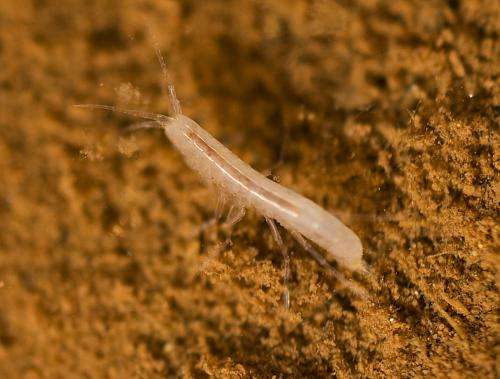The ancient Britons: 'Groundwater shrimp' survive 19 million years of climate change

(Phys.org) —New research has revealed that Britain and Ireland's oldest known inhabitants are tiny crustaceans still living today in water-filled crevices deep beneath our feet.
Over the last 60 million years, Britain and Ireland have experienced dramatic climate change, with conditions ranging from warm and wet periods, to arid episodes and then repeated coverings by glaciers. For this reason, it was not thought that any animal species (fauna) could have survived through these fluctuations.
Now, a new study led by Dr Bernd Hänfling, Lecturer in Ecology and Evolution at the University of Hull has yielded some surprising results. Published in the journal Molecular Ecology, it shows that two species of Niphargus (small, shrimp-like animals) have persisted in Britain and Ireland for at least 19 million years; making them the oldest known inhabitants of these countries.
Dr Hänfling explains the significance of the data. He said: "All previous research shows that the majority of fauna in Britain and Ireland arrived from mainland Europe following the most recent glaciations. We have a few unique animal species - for example, the Irish hare - but these are rare and most importantly, they have only been around for a few tens of thousands of years."
"In contrast, our results show that subterranean groundwater contains by far the oldest animals that are unique to Britain and Ireland. These species must have survived a wide range of temperatures as the climate shifted between glacial and warm conditions."
The study was carried out in collaboration with researchers at the British Geological Survey, the University of Ulster and the University of Roehampton. In total, 679 Niphargus specimens were collected from boreholes, springs and wells in Britain, Ireland, Belgium, the Netherlands, Germany and France. DNA sequence data from these individuals was then combined with all published Niphargus sequence data on the GenBank database. Studying this information allowed the researchers to uncover the evolutionary relationships between the different Niphargus species.
Dr Louise Maurice, a hydro-geologist on the team from the British Geological Survey, said: "We think that because the temperature and chemistry of groundwater changes much more slowly than surface water, this may have protected Niphargus from some of the extreme conditions that led to the extinction or migration of other animals."
"The most recent common ancestor uniting these two species probably lived in south-west England around 19 million years ago, when the British and Irish land masses were still joined.
"In addition, the genetics show that over the last five million years, there have been at least another three other occasions when Niphargus has arrived in Britain from mainland Europe. Each of these colonisation events has led to the evolution of a separate and unique Niphargus species."
The results highlight that groundwater ecosystems provide an important contribution to natural biodiversity. Unfortunately, conservation policy measures to protect these ecosystems in Europe, lag far behind countries such as Australia. This means that despite their ancient resistance, European Niphargus fauna could now be vulnerable.
Professor Anne Robertson, a freshwater ecologist from the University of Roehampton said: "These species have existed for many millions of years, but whether they will survive the pressures on their habitat inflicted by man remains to be seen."
"Predicting how different ecosystems will respond to climate change is one of the major challenges facing the scientific community today. If we can increase our understanding of how these Niphargus species have persisted for so long, it may help shed light on this important area of research."
More information: Mcinerney, C. E., Maurice, L., Robertson, A. L., Knight, L. R., Arnscheidt, J., Venditti, C., Dooley, J. S., Mathers, T., Matthijs, S., Erikkson, K., Proudlove, G. S., Hänfling, B., 2014. The Ancient Britons: Groundwater fauna survived extreme climate changes over tens of millions of years across NW Europe. Molecular Ecology
Journal information: Molecular Ecology
Provided by University of Hull

















